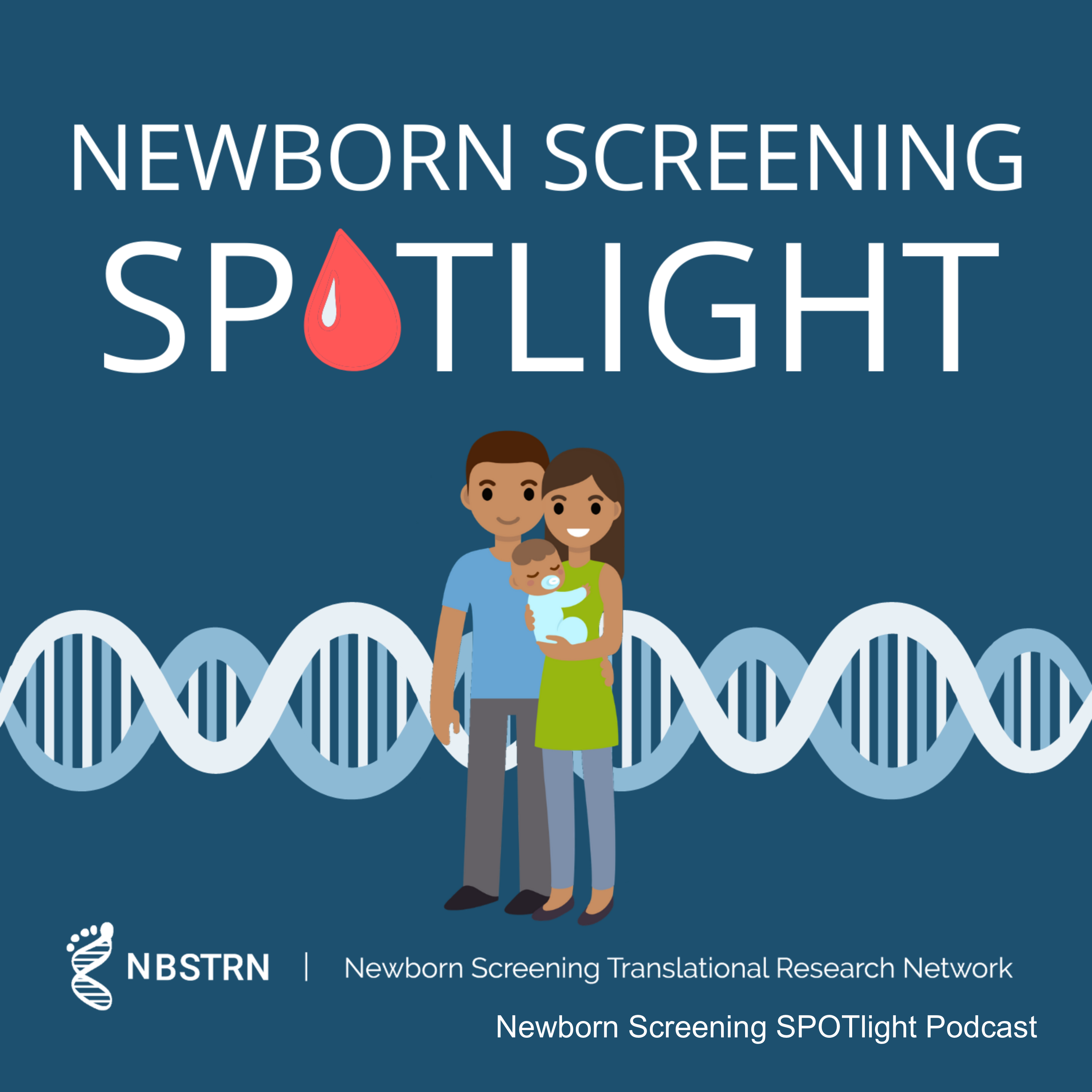
6.4K
Downloads
27
Episodes
This podcast is about the advancement of rare disease research told by health professionals, researchers, parents, and advocates. This podcast is for you to learn how newborn screening research saves the lives of babies every day through discoveries of new technologies and treatments. You will hear stories from experts who treat babies, the families who care for them, and the researchers who make it all happen.
Episodes
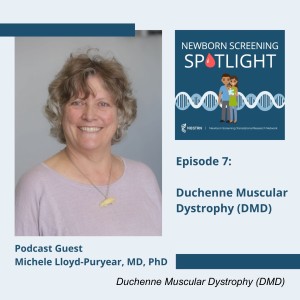
Wednesday Oct 20, 2021
Duchenne Muscular Dystrophy (DMD)
Wednesday Oct 20, 2021
Wednesday Oct 20, 2021
In this episode, you will hear from Dr. Michele Lloyd-Puryear talk about the diagnosis process and current intervention for Duchenne Muscular Dystrophy also known as DMD. We will learn how parent lay advocacy group plays a role in NBS and NBS research. Whether you’re a parent, health professional, researcher, or advocate, there are many ways to get involved with NBS research
Michele Lloyd-Puryear, MD, PhD, is a pediatrician and geneticist and has held academic appointments and has worked in pediatric clinics at the local and international levels. She is a Fellow of the American Academy of Pediatrics and an Emeritus Member of the American College of Medical Genetics and Genomics. Over her 40-year commitment to infants, children, and mothers, she has made numerous contributions internationally and nationally to programs that have improved and expanded the quality, services, and scope of the NBS and the care for children identified through NBS. Recognition for her work in maternal and child health, genetics services and NBS include awards from HHS, the Association of Public Health Laboratories; the March of Dimes; the Genetic Alliance and the Sickle Cell Disease Association of America.
Interview Questions:
- What is Duchenne Muscular Dystrophy (also known as DMD)?
- How about babies diagnosed for DMD and what are the current interventions?
- You have an MD and a Ph.D. and are trained as a pediatrician and geneticist. How did you get involved with newborn screening research?
- What role do parent lay advocacy groups play in newborn screening and NBS research?
- How can parents, health professionals, and researchers get involved in NBS research for DMD?
- You have played a variety of roles in NBSTRN. What areas do you see NBSTRN can play a role in NBS research?
- What does NBS research mean to you?
To learn how to get involved in newborn screening research, visit www.nbstrn.org
.
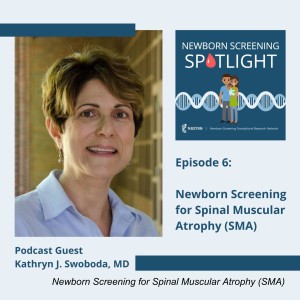
Monday Aug 30, 2021
Newborn Screening for Spinal Muscular Atrophy (SMA)
Monday Aug 30, 2021
Monday Aug 30, 2021
You’re listening to the voice of Dr. Kathy Swoboda, who is the Katherine B. Sims MD Endowed Chair in Neurogenetics and Director of the Neurogenetics Unit in the Center for Genomic Medicine at the Massachusetts General Hospital and Harvard Medical School. Her research and clinical activities are dedicated to the diagnosis and treatment of inherited motor disorders of childhood-onset, with a particular focus on genotype-phenotype studies documenting onset and timing of progressive denervation in infants with Spinal Muscular Atrophy, also known as SMA.
Dr. Swoboda collaborated closely with Cure SMA in helping to obtain critical data necessary to support the addition of SMA to the Newborn Screening Recommended Universal Screening Panel (RUSP), and with the American College of Medical Genetics and Genomics (ACMG) and Newborn Screening Translational Research Network also known as NBSTRN to build tools suitable for use for newborn screening follow-up for infants with SMA.
In this episode, Dr. Swoboda will describe the important research efforts that led to newborn screening for spinal muscular atrophy (SMA) and how different interventions are impacting the lives of newborns with SMA. Dr. Swoboda has played a significant role in getting SMA to be added to the recommended uniform screening panel (RUSP) and her journey from a clinician to a researcher is truly inspiring. So, listen on.
Interview Questions with Dr. Swoboda:
1. Could you tell us what is spinal muscular atrophy (also known as SMA)?
2. You and your research were involved in SMA being recommended to nationwide screening. Can you describe this experience?
3. How have the families you work with been impacted by the addition of SMA to nationwide newborn screening?
4. What is the importance of early identification and treatment by NBS. What are current interventions for individuals with the SMA?
5. Why is NBS research for SMA important?
6. How has NBSTRN helped your research in SMA?
7. What career advice could you give to someone interested in being a clinician-researcher like yourself?
8. What does NBS research mean to you?
To learn more about newborn screening research, visit www.nbstrn.org
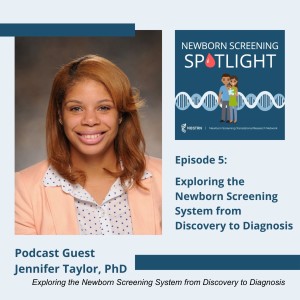
Thursday Aug 05, 2021
Exploring the Newborn Screening System from Discovery to Diagnosis
Thursday Aug 05, 2021
Thursday Aug 05, 2021
You're listening to the voice of Dr. Jennifer Taylor, a Genomic Scientist at the American College of Medical Genetics and Genomics (ACMG), who is working on several projects at the Newborn Screening Translational Research Network. In this episode, Dr. Taylor explores the newborn screening system from discovery to diagnosis. She will highlight how research and in particular, the discovery of new technologies to screen, diagnose and treat all begin with a newborns in the first days following birth – whether it is a physiological test performed in the newborn nursery or a blood sample, collected and saved as small drops of blood on filter paper.
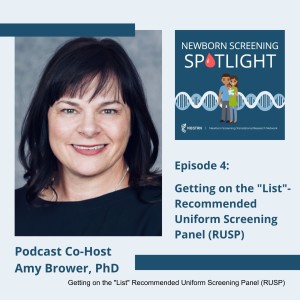
Monday Jul 12, 2021
Getting on the "List" - Recommended Uniform Screening Panel (RUSP)
Monday Jul 12, 2021
Monday Jul 12, 2021
You're listening to the voice of Dr. Amy Brower, the co-host of the Newborn Screening SPOTlight Podcast. This episode focuses on the common question, What does it take to get on the "list"? The list refers to the Recommended Uniform Screening Panel (RUSP) which is a national guideline for newborn screening (NBS).
Dr. Amy Brower was an inaugural member of a Federal Advisory Committee created during the administration of President George W. Bush. In 2004, the Advisory Committee on Heritable Disorders in Newborns and Children was established under the Public Health Service Act and was charged with advising the Secretary of Health and Human Services about aspects of newborn and childhood screening. Their charter includes recommending improvements in the national newborn and childhood screening programs. This includes making systematic evidence-based and peer-reviewed recommendations on which disorders should be included in newborn screening. During Dr. Brower's tenure on the Committee, they developed a system of nomination and review that was open to all stakeholders. The idea was to encourage not only researchers and clinicians to nominate a condition but also parents, patients, families, and advocacy groups.
Listen to this episode to learn the:
- history of Recommended Uniform Screening Panel (RUSP).
- nomination process on getting a condition added to the RUSP list.
- importance of pilot study in advancing newborn screening research.
- how NBSTRN helps with NBS pilot study.
Here are ways you can get involved with NBS research:
- Attend a meeting organized by the Advisory Committee on Heritable Disorders in Newborns and Children. Find the meeting dates and time at https://www.hrsa.gov/advisory-committees/heritable-disorders/index.html
- Support the Newborn Screening Saves Lives Reauthorization Act of 2021. Learn more at https://www.congress.gov/bill/117th-congress/house-bill/482/text
- Become a member of NBSTRN to connect with communities of researchers, health professionals, families, advocacy groups and state newborn screening programs. Learn more about membership, visit www.nbstrn.org
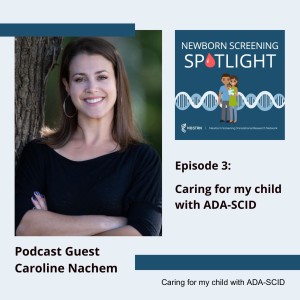
Sunday Jun 13, 2021
Caring for my child with ADA-SCID
Sunday Jun 13, 2021
Sunday Jun 13, 2021
You’re listening to the voice of Caroline Nachem who currently lives in VA with her husband and two children. She graduated from Old Dominion University in Virginia with a degree in history and studied anthropology. She became a stay-at-home mom when her daughter was born, and shortly after was inducted into medical motherhood. She spent the next several years caring for her daughter as she had ups and downs in her health. She also gave birth to her son as well who are now 7 and 5. In the podcast episode, Caroline will share her story and her advice to new moms in a similar situation, caring for a child with a genetic condition. Her message “You’re not alone.
Interview Questions:
- Your newborn was diagnosed with a condition through NBS. Can you tell us about how you found out about the screen and what happened next?
- Could you share your process in caregiving to your child with SCID? Any advice for new moms?
- Researchers discovered the test to screen for SCID and helped refined the treatments. What is one common myth about newborn screening research in SCID?
- Before your child was diagnosed with SCID were you aware of NBS?
- What do you think prospective parents should know about newborn screening?
- How has being a member of NBSTRN changed your thinking on newborn screening?
- What does NBS research mean to you?
To learn how you can help advance newborn research, advocate for rare disease screening and treatment, and learn about important discoveries, become a member of the Newborn Screening Translational Research Network by visiting our website at www.nbstrn.org.
Thank you for listening to this episode of Newborn Screening SPOTlight. If you like our podcast, please subscribe and share an episode with your colleagues, friends and family.
Get involved! Stay informed! Help us advance discoveries! Together, let’s increase the impact of newborn screening research by listening to your stories.
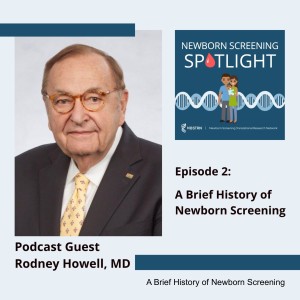
Sunday Jun 13, 2021
A Brief History of Newborn Screening
Sunday Jun 13, 2021
Sunday Jun 13, 2021
You’re listening to the voice of Dr. Rodney Howell, who is a Professor and Chairman Emeritus of Pediatrics and Emeritus Member of the Hussman Institute for Human Genomics at The Miller School of Medicine of the University of Miami. He is certified by the American Board of Pediatrics as well as the American Board of Medical Genetics and Genomics in Clinical Biochemical Genetics. Dr. Howell was founding chair of the U.S. Congressionally-mandated Secretary’s Advisory Committee of Heritable Disorders in Newborns and Children (2004-2011) This is a committee that advises the Secretary of Health and Human Services on issues concerning genetic testing in children. During this time, this committee oversaw the development of the Recommended Uniform Screening NBS Panel (The RUSP). Dr. Howell serves as advisor to Newborn Screening Translation Research Network.
In this episode, you will get a brief history of newborn screening and newborn screening research and the stories of families impacted by newborn screening. Learn how it all got started.
Interview with Dr. Rodney Howell:
- Newborn screening began in the 1960’s with screening to prevent intellectual disability. What were the important milestones in NBS over the years? How did it all get started?
- You were integral with the beginning of the Advisory Committee on Heritable Disorders in Newborns and Children. Can you tell us about the committee and how it fits into NBS?
- Research discovers new technologies to screen, diagnose and treat newborns. Why is NBS research important?
- Where do you see NBS and NBS research going in the next ten years? 50 years?
- What advice would you give someone wanting to pursue a career similar to yours?
- You have been an important advisor to the NBSTRN. What role does NBSTRN play? What role should NBSTRN play?
- What does NBS research mean to you?
To learn how you can help advance newborn research, advocate for rare disease screening and treatment, and learn about important discoveries, become a member of the Newborn Screening Translational Research Network by visiting our website at www.nbstrn.org.
Thank you for listening to this episode of Newborn Screening SPOTlight. If you like our podcast, please subscribe and share an episode with your colleagues, friends and family.
Get involved! Stay informed! Help us advance discoveries! Together, let’s increase the impact of newborn screening research by listening to your stories.
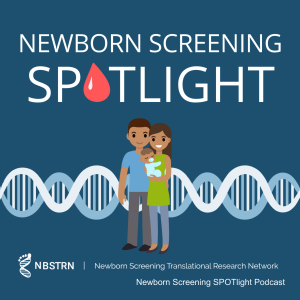
Wednesday Jun 02, 2021
Newborn Screening SPOTlight Podcast Trailer
Wednesday Jun 02, 2021
Wednesday Jun 02, 2021

Hello, this is the “Newborn Screening SPOTlight”. This podcast is about the advancement of rare disease research told by health professionals, researchers, parents and advocates. This podcast is for you to learn how newborn screening research saves the lives of babies every day through discoveries of new technologies and treatments. You will hear stories from experts who treat babies, the families who care for them, and the researchers who make it all happen. We are your co-hosts, Dr. Kee Chan and Dr. Amy Brower. We are from the Newborn Screening Translational Research Network (also known NBSTRN). Our work is supported by one of the institutes at the National Institutes of Health in Bethesda Maryland called the Eunice Kennedy Shriver National Institute of Child Health and Human Development (also known as NICHD). We are from the American College of Medical Genetics and Genomics (also known as ACMG) and ACMG leads the NBSTRN. Screening babies saves lives every day, and research advances newborn screening by developing new technologies to screen, diagnose and treat. NBSTRN helps accelerate research by creating tools, resources and expertise for researchers, doctors, families, patients and advocates. To learn how you can help advance newborn research, advocate for rare disease screening and treatment, and learn about important discoveries, become a member of the Newborn Screening Translational Research Network by visiting our website at www.nbstrn.org. Thank you for listening to this episode of Newborn Screening SPOTlight. If you like our podcast, please subscribe and share an episode with your colleagues, friends and family. Get involved! Stay informed! Help us advance discoveries! Together, let’s increase the impact of newborn screening research by listening to your stories.
